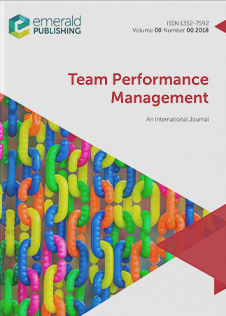Team Performance Management
Issue(s) available: 125 – From Volume: 1 Issue: 1, to Volume: 30 Issue: 1/2
Strapline:
An International Journal
Volume 30
-
Issue 1/2 2024
Volume 25
Volume 23
Volume 20
Volume 19
Volume 18
Volume 17
Volume 16
Volume 15
Volume 14
Volume 5
Volume 4
Creating space for playfully learning to collaborate across organizational boundaries
Sandra G.L. Schruijer, Tharsi C.B. Taillieu, Leopold S. Vansina, Petru L. CurșeuThe purpose of this paper is to introduce the authors’ action research praxis regarding the development of collaborative relations between organizations that incorporates an…
Identifying as lesbian, gay, and bisexual at work: atemporal associations between sexual identity disclosure and work team experiences
Jesse Caylor, Jessica L. Wildman, Catherine WarrenAlthough sexual identity disclosure in the workplace can be related to heightened adversity for lesbian, gay or bisexual (LGB) employees, disclosure can also serve as an avenue…
Expectations and experiences of group conflict during military training exercises and their impact on deployment self-efficacy: the role of positive psychological capital
Maria Ioana Telecan, Petru Lucian Curseu, Claudia Lenuta Rus, Lucia RatiuThis study aims to explore the intrapersonal underpinnings of conflict transformation and expression during military deployment exercises.
An approach to intercultural training deemphasizing cross-cultural differences
Ype H. PoortingaThis paper aims to present an approach to intercultural training (IT) in which course participants are informed about various approaches to differences between peoples. Pitfalls…
The impact of team competence on short- and long-term team performance
Annabelle Beyer, Saskia Hohagen, Uta Wilkens, Valentin LangholfDue to the current shortage of skilled employees, there is a growing need to cope with given team settings and to offer appropriate team training. For team training, it is…
Teams need to be healthy, too: toward a definition and model of healthy teams
Allison Traylor, Julie Dinh, Chelsea LeNoble, Jensine Paoletti, Marissa Shuffler, Donald Wiper, Eduardo SalasTeams across a wide range of contexts must look beyond task performance to consider the affective, cognitive and behavioral health of their members. Despite much interest in team…
ISSN:
1352-7592Online date, start – end:
1995Copyright Holder:
Emerald Publishing LimitedOpen Access:
hybridEditor:
- Associate Professor Sjir Uitdewilligen
